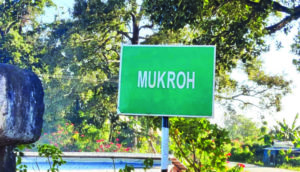
government on our behalf it should have the consent of the Chnong. We should give those petitions to the government and the pressure groups can follow up with the government since they are in Shillong.”
SHILLONG, Dec 4: The VIPs have all come and gone. Now there’s a lull over Mukroh as women gather around their sisters who are still grieving over the loss of a breadwinner – the sole earning member in the family, in the November 22 firing by Assam Police. The rice grains have been harvested and dried outside in the compound. A village with roughly about 600 households and a population of about 3,000 (last census 2011, 380 families, population 1,977), depends entirely on farming. Poverty is writ large on the faces of a large section of the villagers who live in one or two-roomed homes and a hut for a separate kitchen.
Carmel Lamin, a village elder of Mukroh who this correspondent met says that there are about 400 households who have a patta (land document). When the villagers go to the Jaintia Hills Autonomous District Council for land registration to legalise their land holdings, the Council delays the matter. He said the villagers are already poor but they are expected to pay for the forms, and when the Council officers come to measure their land, they have to pay them as well. After filling up the forms they still have to wait in vain until money changes hands. This is what encourages incursion from the Karbi Anglong side.
Lamin says, “All private forests too have been registered with the JHADC. So the Council is in a better position to sort out the disputes with the Karbi Anglong Autonomous Council. But there has only been silence from our side.”
The women who are gathered to discuss their dismal future say if the Meghalaya government has a border outpost it should be closer to Mokoilum and much beyond their farmlands so that they can feel safe when they go farming.
“There is no point having a police outpost inside Mukroh because we are constantly harassed by the Karbi Anglong Forest Guards. We have to pay them for harvesting our farm and forest produce and even the broomstick, hay, bamboo etc. When we go to our farms there is always fear whether we will return home safe. Only when we reach home do we feel safe. Imagine living with this pervasive fear all the time,” the women said.
What is striking about the village is the number of children that each woman has. Some mothers look as if they are barely out of their teenage years. Awareness on family planning and child birth spacing is something alien here. At present there are six LP schools but no upper primary or high school. The high schools are located in Barato about 3 km away. In 2011 the literacy rate was 40.52%. At present the literacy rate is about 60% according to a teacher there.
One of the women who lost her husband recently has five children but she is also looking after five orphaned children of her deceased sister with no assistance from any quarters.
Mukroh residents suffer from acute water scarcity during the dry season. When asked if the Jal Jeevan Mission has arrived at their village they looked surprise and asked “what is that?” No they have never heard of the Jal Jeevan Mission. One or two households that can afford to have dug bore wells. The rest of the villagers depend on river water which they have to bring from a distance. Lamin says most schemes do not reach the village and though local MLA Nujorki Sungoh does try to improve the approach roads to the village and to bring development projects so much is left to be done. Thanks to the rains they are able to grow ginger, turmeric and other vegetables for their own consumption. Some families with bigger landholdings are able to sell the excess produce.
For the villagers of Mukroh the nearest market is at Mokoilum which Assam claims is its territory but which the villagers of Mukroh claim is well within Meghalaya. Some stall owners at the market are from Sahsniang and other border villages.
The village elders including Carmel Lamin and Hynniewlad Kyndiah and also the women that this correspondent met have expressed their displeasure with the reception given to Chief Minister Conrad Sangma and his team of ministers by some pressure groups with a string of shoes across the road.
Lamin says, “This has given a bad name to our village and we do not welcome such interference into our affairs. Also if any group submits a memorandum to the government on our behalf it should have the consent of the Chnong. We should give those petitions to the government and the pressure groups can follow up with the government since they are in Shillong.”
Meanwhile the only sign of progress in Mukroh is the smooth NEC financed road connecting Barato in West Jaintia Hills with Mokoilum now in West Karbi Anglong District of Assam. Otherwise getting to Mukroh which is 127 km from Shillong takes all of 5 hours on a good day. On other days when the traffic jam starts from Jowai to Mookyndur it could take 15 hours both ways. That’s how roads, or the lack of it, have turned rural Meghalaya into disparate places left to their own devices.



